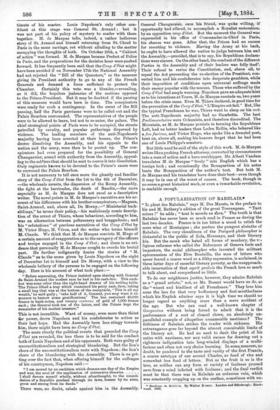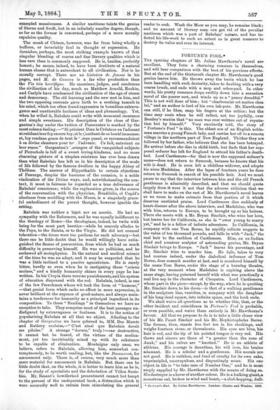A POPULARISATION OF RABELAIS.*
"Ix. plait des Rabelais," says M. Des Marets, in the preface to his and M. Rathery's edition of the great Tonrangeau. "Taut mieux !" he adds ; "tout le monde en 'tura." The truth is that Rabelais has never been so much read in France as during the last two decades. France is in too bitter a mood to relish the mere wine of Montaigne ; she prefers the pungent absinthe of Rabelais. The very cleanliness of the Perigord philosopher is distasteful to the public of Zola, Honssaye, and their literary kin. But the monk who hated all forms of monkery, the re- ligious reformer who called the Reformers of Geneva fools and impostors, the social philosopher who invented the militant epicureanism of the Dive Bouteille, the man of letters who never feared a coarse word or a filthy expression, is acclaimed, in these latter days of sneerful literary poverty, as the unapproach- able incarnation of that esprit gaulois the French love so much to talk about, and comprehend so little.
To do our neighbours justice, however, they admire Rabelais as a " grand artiste," not, as Mr. Besant would have us do, as the " wisest and kindliest of all Frenchmen." They love him none the less for that very buffoonery and foul-morithedness which his English admirer says it is high time we should no longer regard as anything more than a mere accident of the age. But who can read a well-known chapter of Gargantuct without being forced to admit that it is the performance of a sort of cloacal clown, an absolutely un- paralleled example of altogether unnameable nastiness ? The filthiness of Rabelais. strikes the reader with sickness. His extravagance goes far beyond the utmost conceivable limits of the literary art. He had no need to daub the point of his satire with nastiness, nor any valid excuse for drawing out a righteous indignation into long-winded displays of a multi- farious and often not very choice learning. In some.measure, no doubt, he pandered to the taste and vanity of the first Francis, a coarse antetype of our second Charles, as fond of vice and somewhat less fond of letters. But as the fruit is so is the tree, so neither can any form or variety of foulness proceed save from a mind infected with foulness ; and the final verdict must be that there was in Rabelais an ordurous vein, which was constantly cropping up on the surface, sometimes with un- 4' Readings in Rabelais. By Walter Beeant. London and Edinburgh: Black- wood. 1883.
exampled massiveness. A similar nastiness taints the genius of Sterne and Swift, but in an infinitely smaller degree, though, as far as the former is concerned, perhaps of a more morally repulsive quality.
The monk of Chinon, however, was far from being wholly a buffoon, or invariably foul in thought or expression. He furnishes, perhaps, the most striking example known of that singular blending of coarse and fine literary qualities which is less rare than is commonly supposed. He is, besides, perfectly honest ; he seems, indeed, to have been destitute of a natural human shame that is antecedent to all civilisation. Nor is he morally corrupt. There are no histoires de femme in his pages, and M. de Clamors is a far viler production than the Vie tres horrifique. He examines, judges, and condemns the civilisation of his day, much as Matthew Arnold, Ruskin, and Carlyle have condemned the civilisation of the age of steam and democracy. The old learning and the new met in him, and the two opposing currents gave birth to a seething tumult in his mind, which too often found expression in boundless extrava- gance and unutterable foulness of ideas and phraseology. Yet, when he willed it, Rabelais could write with measured reverence and simple sweetness. His description of the close of Gar- gantua's day under the tuition of Ponocrates is marked by the most solemn feeling:—" Si prioient Dien le Cr4ateur en l'adorant et ratifiantleur foy envers luy, et le r,iorifiant de an bonte immense; et, lay rendans grace de tout le ' amps passé, se recommandoient
sa divine clemence pour to . radvenir. Ce fait, entroient en lour repos." Gargantua's '.arangue of the vanquished subjects of Pierochole is full of a sweet loving-kindness, and no more charming picture of a utopian existence has ever been drawn than what Rabelais has left us in his description of the mode of life followed by the famous dwellers in the happy Abbey of Th4leme. The answer of Hippothad6e to certain objections of Panurge, despite the baseness of the occasion, is a noble vindication of the Divine ways, and, notwithstanding the con- text, it must in fairness-be regarded as a true deliverance of Rabelais' conscience ; while the explanation given, in the course of the conversation with the physician, Roudibilis, of Cupid's aloofness from meddling with the Muses, is a singularly grace- ful embodiment of the purest thought, however ignoble the setting.
Rabelais was neither a bigot nor an ascetic. He had no sympathy with the Reformers, and he was equally indifferent to the theology of Rome—the theologians, indeed, he twits with being for the most part heretics—while he scarcely alludes to the Pope, to the Saints, or to the Virgin. He did not counsel toleration—the times were too perilous for such advocacy—but there can be little doubt that he would willingly have extin- guished the flames of persecution, from which he had so much difficulty in preserving himself. He was no politician, and he eschewed all metaphysics. In the natural and medical science of the time be was an adept, and it may be suspected that he was a little inclined to a passive agnosticism. He is rarely bitter, hardly so even when he is castigating those " °deux moines," and a kindly humanity shines in every page be has written. In his Utopia there were no punishments, and his system of education dispensed with the rod. Rabelais, indeed, is one of the few Frenchmen whose wit took the form of "humour," —that genial form which seeks no effect in mere expression, is never brilliant at the expense of good-nature, and always main- tains a tenderness for humanity as a principal ingredient in its composition. To these " Reading@ " in themselves we have no exception to take. They comprise most of the best passages an- disfigured by extravagance or foulness. It is to the notion of popularising Rabelais at all that we object. Alluding to the chapter of Gargantua we have referred to, MM. Des Marets and Rathery exclaim,—" C'est ainsi que Rabelais dorait see pilules." A strange "dornre," truly !—one destructive, it cannot 'but be feared, of the virtues of the medica- ment,, yet too inextricably mixed up with its substance to be capable of elimination. Montaigne only once, we believe, refers to Rabelais, allowing him, somewhat con- temptuously, to be worth reading, but, like the Decameron, for amusement only. There is, of course, very much more than ,mere material for amusement in Rabelais. But there can be little doubt that, on the whole, it is better to leave him as he is, for the study of specialists and the delectation of Villon Socie- ties. mr. Besant's bowdlerised presentment cannot but tempt to the perusal of the undepurated book, a distraction which it were assuredly well to refrain from stimulating the general
reader to seek. Wash the Moor as you may, he remains black; and no amount 'of literary soap can get rid of the peculiar nastiness which was a part of Rabelais' nature, and has in- fected his life-work to such an extent as in great measure to destroy its value and even its interest.



































 Previous page
Previous page